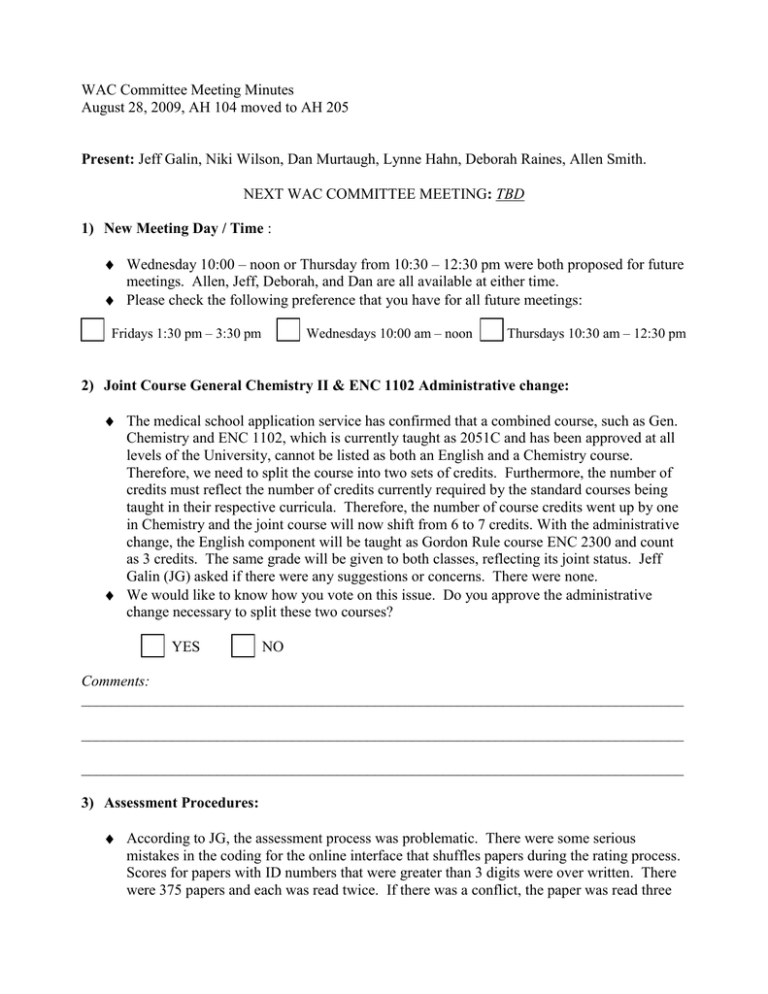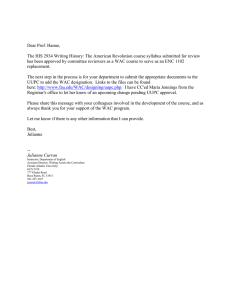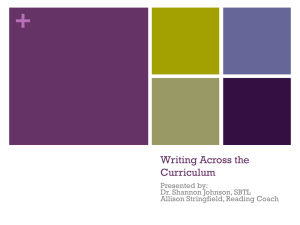WAC Committee Meeting Minutes :
advertisement

WAC Committee Meeting Minutes August 28, 2009, AH 104 moved to AH 205 Present: Jeff Galin, Niki Wilson, Dan Murtaugh, Lynne Hahn, Deborah Raines, Allen Smith. NEXT WAC COMMITTEE MEETING: TBD 1) New Meeting Day / Time : Wednesday 10:00 – noon or Thursday from 10:30 – 12:30 pm were both proposed for future meetings. Allen, Jeff, Deborah, and Dan are all available at either time. Please check the following preference that you have for all future meetings: Fridays 1:30 pm – 3:30 pm Wednesdays 10:00 am – noon Thursdays 10:30 am – 12:30 pm 2) Joint Course General Chemistry II & ENC 1102 Administrative change: The medical school application service has confirmed that a combined course, such as Gen. Chemistry and ENC 1102, which is currently taught as 2051C and has been approved at all levels of the University, cannot be listed as both an English and a Chemistry course. Therefore, we need to split the course into two sets of credits. Furthermore, the number of credits must reflect the number of credits currently required by the standard courses being taught in their respective curricula. Therefore, the number of course credits went up by one in Chemistry and the joint course will now shift from 6 to 7 credits. With the administrative change, the English component will be taught as Gordon Rule course ENC 2300 and count as 3 credits. The same grade will be given to both classes, reflecting its joint status. Jeff Galin (JG) asked if there were any suggestions or concerns. There were none. We would like to know how you vote on this issue. Do you approve the administrative change necessary to split these two courses? YES NO Comments: ________________________________________________________________________________ ________________________________________________________________________________ ________________________________________________________________________________ 3) Assessment Procedures: According to JG, the assessment process was problematic. There were some serious mistakes in the coding for the online interface that shuffles papers during the rating process. Scores for papers with ID numbers that were greater than 3 digits were over written. There were 375 papers and each was read twice. If there was a conflict, the paper was read three times. Almost twice as many papers were read because of all the glitches. The norming process was productive, but it was determined later that it did not follow all appropriate procedures. We were supposed to norm until each trait was no more than one point apart on a scale of 1-4. In essence, the group should have been norming for a full day and a half before reading our first paper. The data that we gathered during our rating process will be kept for future reference, but the results are not conclusive enough to warrant an official report. We will still work with the student survey data that we collected. The governing questions for our assessment study are: What does writing look like across multiple classes, disciplines, levels? What is it that we can learn from a comparison of those papers and how can we use that data to help a department or college reflect on the way they teach writing in their courses. What values are faculty addressing in their students’ writing? Student writing should reflect those values. We as a committee have to decide if we are still satisfied with our current assessment rubric and procedures. We do not have usable data yet but JG would like to get a few years worth of data. Should we go on with this design? Should we reduce the number of traits? How should we change the training? Should we consider focusing on certain disciplines in a given year? English department syllabi are being assessed and recertified this year. Should we develop rubrics that are specific to departments (potentially three or four of them)? Deborah Raines (DR): there are certain things that we each teach in our discipline that are important in their writing. There could be core items that are used for every paper in the University and then another set that are specific to the discipline. Allen Smith (AS): there is also the nature of the topic that is used in each discipline. JG feels the assignment is not necessary for our assessment process. It is the teacher’s responsibility to decide whether the paper responds to the assignment. Our goal is to see what kind of writing students are doing. Having assignments involved in the assessment process is actually a bad idea, according to a recent conference that JG attended. Daniel Murtaugh (DM): how prevalent is it that students fail to meet these certain requirements? If they follow the recipe they might not necessarily have good writing. DS uses the rubric in her classroom and asks them to turn it in with her paper. Few schools are using such a university wide rubric. But, if we could get it to work, the amount of data would be very useful. Alternative strategies – survey given out to students, faculty, and affiliates of the discipline (graduates, experts in field) – get that data back and see what the opinions are about writing in the discipline and use to determine goals for writing in the discipline. Other universities are doing this with multi-million dollar grants. We would need a system that is manageable and practical. DS feels with fewer traits we may get better data. JG noted that the interface has been the problem and/or training and believes we should try one more time and see if we can get usable data with everything working properly. DS would like to see the results of scoring for the students in her class. JG could provide anonymous scores. We want you to look at the rubric with an eye towards change and then, in the comments section below or in an attached document, please tell us your response to the following questions: Are there elements that you would remove? Think about your own curriculum. Determine whether the criteria are appropriate for your discipline. Would you advocate a 3 rubric model and do it by fields instead of universal? Should we go on with this design? Should we reduce the number of traits? Should we consider focusing on certain disciplines in a given year? Should we develop rubrics that are specific to the sciences, social science, humanities, and the arts? Comments: ________________________________________________________________________________ ________________________________________________________________________________ ________________________________________________________________________________ ________________________________________________________________________________ 4) Verbiage on the faculty assessment instructions: Should instructors be allowed to give extra credit or penalties for assessment? DS told students that if they submitted their paper, they received 10 points or they had the option of doing another assignment for 10 points. Some students ask “what’s in it for us?” according to Lynne Hahn (LH). LH pointed out that in her computer classroom she can set time aside to have everyone upload their papers during class time. DM believes that you can respond to students by revealing the process of learning in the University setting and that every legitimate student should understand that he or she is participating in something larger than themselves. JG points out that there cannot be an impact on the grade for students not participating. Instructors should, as DM recommended, stress the importance of agreeing to have their results aggregated numerically into a university profile and available for research use. DM moved to remove the language regarding a penalty for failing to participate in assessment. Does the Committee believe the language “instructors may elect to enforce a penalty for failure to participate in the university assessment process” should be removed from the instructions? YES NO Should there also be language stating that instructors cannot give incentives? YES NO Comments: ________________________________________________________________________________ ________________________________________________________________________________ ________________________________________________________________________________ 5) ENC 3213: ENC 3213 is currently not meeting WAC requirements, as determined by papers submitted for the recent assessment process. For those sections that are currently producing writing that meets WAC requirements, there remains a question regarding the collaborative nature of that writing. In the past, we have discussed the fact that argument-based papers should be individually written. Many of the papers in ENC 3213 are collaboratively written. Dr. Julia Mason recently pointed out to JG that in most writing fields, collaborative writing is required. Since our aim is to assess the quality of writing and not individual students, should we edit the WAC requirements to include collaborative writing? YES NO Comments: ________________________________________________________________________________ ________________________________________________________________________________ ________________________________________________________________________________ ________________________________________________________________________________ 6) Class Size Limit: Is there a fixed class size limit? Some classes are up to 34 with a T.A. in the class. Is that okay? The committee has said previously that course limits should be set to a 22-student cap for 1101/1102 and 27-student cap for upper level courses. These limits have never been university policy. Rather they have served as recommendations. Do you agree that we should have a policy that explicitly states these caps for a WAC class taught by an individual faculty member? YES NO Should the caps be higher for WAC classes taught with a faculty member and a teaching assistant? Currently, for instance, there are several sections of Philosophy with 34 students per class. YES NO Comments: ________________________________________________________________________________ ________________________________________________________________________________ ________________________________________________________________________________ ________________________________________________________________________________ 7) The recertification process for 2009-10: It was determined that if there are obvious syllabus deficiencies regarding WAC requirements, Niki and Jeff will return the syllabus to the instructor with the option to revise them before they go out to the committee. A committee member will review all the syllabi for an individual instructor to look for patterns and note changes across classes. 8) Brownbag Lunch Series: Do you have ideas for the 2009-10 Brownbag Lunch Series? ________________________________________________________________________________ ________________________________________________________________________________ ________________________________________________________________________________ Could you act as a discussion leader at one of the Brownbag Lunch sessions? YES NO Please send in your responses and comments either via email to NWILSON3@fau.edu or deliver the hard copy to Niki Wilson’s mailbox in SO 307 by Tuesday, September 8th. Thank you.

